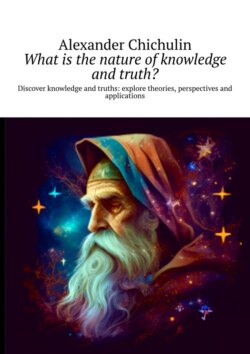Читать книгу What is the nature of knowledge and truth? Discover knowledge and truths: explore theories, perspectives and applications - - Страница 2
1. Introduction: Defining Knowledge and Truth
ОглавлениеIn our everyday lives, we often rely on the concepts of knowledge and truth to make sense of the world around us. We seek to acquire knowledge through our experiences, observations, and interactions with others, and we use this knowledge to inform our beliefs and actions. At the same time, we value truth as a standard of accuracy and reliability, striving to ensure that our beliefs and actions are consistent with the facts of reality.
But what exactly do we mean by knowledge and truth, and how do we come to know what we know? These are fundamental questions that have been explored by philosophers and scholars throughout history, and they continue to be the subject of ongoing debate and inquiry. In this book, we will explore different perspectives on the nature of knowledge and truth, examining the ways in which they are defined, acquired, and applied in various contexts.
By delving into these topics, we will gain a deeper understanding of how we come to know what we know, how we determine what is true, and how these concepts shape our perceptions of the world. We will also explore the implications of these concepts for fields such as science, ethics, and society at large. Ultimately, our goal is to develop a richer and more nuanced understanding of the nature of knowledge and truth, and to consider how we might use this knowledge to enhance our lives and the world around us.
– What do we mean by knowledge and truth?
Knowledge refers to information that we possess or have access to, that we believe to be true and can be justified with reasons or evidence. It involves the ability to understand, recognize, and recall information, as well as the capacity to apply that information in different contexts. Knowledge can be gained through various means such as personal experience, education, observation, reasoning, and communication with others.
Truth, on the other hand, refers to the state or quality of being in accordance with fact or reality. It is often associated with ideas, beliefs, or propositions that correspond to the way things actually are, as opposed to being false or misleading. Truth can be objective, meaning that it exists independently of human opinions or beliefs, or it can be subjective, meaning that it depends on individual perspectives or experiences.
In general, knowledge and truth are interconnected concepts that inform one another. Our knowledge can be said to be true when it corresponds to reality or when it is justified by sound evidence or reasoning. Conversely, our understanding of truth can be shaped and informed by the knowledge that we possess.
– Why are these concepts important to explore?
The concepts of knowledge and truth are important to explore for a number of reasons. Firstly, they are fundamental to our understanding of the world around us, and they play a crucial role in shaping our beliefs, attitudes, and actions. By exploring these concepts, we can gain a deeper understanding of how we come to know what we know, how we determine what is true, and how these concepts influence our perceptions of reality.
Secondly, knowledge and truth are key components of many academic disciplines, including philosophy, science, and ethics. These fields rely on the concepts of knowledge and truth to guide their inquiries and to evaluate the validity of their findings. By exploring these concepts, we can gain a better understanding of how different fields approach the questions of knowledge and truth, and how these approaches might inform one another.
Finally, the concepts of knowledge and truth are highly relevant to contemporary issues in society, such as fake news, misinformation, and the rise of conspiracy theories. By exploring these concepts, we can gain insights into the challenges that arise when people hold false or misguided beliefs, and we can develop strategies for promoting more accurate and reliable knowledge and truth claims.
Overall, exploring the concepts of knowledge and truth is important because it can help us develop a more nuanced and sophisticated understanding of the world around us, and it can inform our beliefs, attitudes, and actions in meaningful ways.
